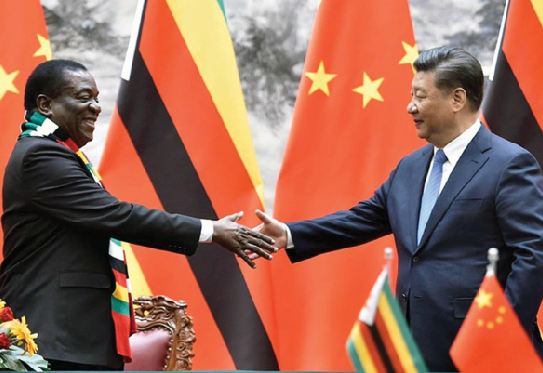Chinese firms invest US$2,3bn in 3 years
China’s Ambassador to Zimbabwe, Mr Guo Shaochun, said Chinese investments in Zimbabwe begun to grow at the turn of the millennium following the imposition of unilateral and illegal sanctions by the West, which resulted in Western investors collectively withdrawing their capital from Harare.
China has invested over US$2 billion in the past three years to become the largest foreign
investor in Zimbabwe, with Chinese companies creating up to 100 000 jobs, Foreign Affairs
and International Trade Minister, Ambassador Frederick Shava said yesterday.
He said this at a symposium to assess the impact of Chinese investments in Zimbabwe that
attracted senior Government officials and representatives of Chinese businesses.
Ambassador Shava said Zimbabwe had witnessed huge growth in investments by the
Chinese government and its private sector ever since President Xi Jinping’s State visit of
2015.
Ambassador Shava
“Our progressive investment laws have generated a conducive environment in support of
investment inflows,” he said.
“During the period 2019 to June 2022, Zimbabwe received US$3,028 billion foreign direct
investment inflows. I am pleased to note that investments from China alone during the
period amounted to US$2,306 billion, representing 76,15 percent of total investment.”
Zimbabwe and China enjoy excellent relations whose status was elevated to a
“Comprehensive Strategic Partnership” in April 2018 during President Mnangagwa’s State
visit.
Chinese business enterprises have contributed significantly to Zimbabwe’s overall
economic growth and increase in the Gross Domestic Product (GDP) through employment
creation, infrastructure development and modernisation of the agriculture sector.
Some of the projects supported by the Chinese government include Kariba South
Hydropower Expansion Project that was commissioned in March 2018 which increased the
installed capacity to 300MW, the expansion of Hwange Power Station where Units 7 and 8
are being added, each with 300MW capacity.
Other key projects include the upgrading of the Victoria Falls International Airport and
Harare City Council Sewer and Water Reticulation Project.
The other major Chinese project is the US$1 billion Manhize Steel Plant operated by Dinson
Iron and Steel Company, a subsidiary of global steel giant Tsingshan Holdings.
President Mnangagwa officially launched the project nearly a fortnight ago.
The integrated project covers mining, processing and beneficiation, and is hosted by
Midlands, Mashonaland East and West provinces, and is expected to create 14 000 direct
and indirect jobs.
It is set to initially produce 600 000 tonnes of steel per annum and the output will rise
progressively, transforming Zimbabwe into one of the world’s top steel producers.
In addition, said Ambassador Shava, the newly constructed Parliament Building in Mount
Hampden “speaks volumes about the positive national impact of an investment of such
magnitude by the Chinese government”.
“It is also pleasing to note that Zimbabwe is cooperating with China in the planning,
construction and management of the Special Economic Zones (SEZs) and the restructuring
of Zimbabwe’s State-Owned Enterprises (SOEs).
“The Chinese government, through the International Cooperation Centre (ICC) of the
National Development and Reform Commission (NDRC), extended training to the
Zimbabwe Government officials on the operationalisation and management of these
Special Economic Zones,” said Ambassador Shava.
China’s Ambassador to Zimbabwe, Mr Guo Shaochun, said Chinese investments in
Zimbabwe begun to grow at the turn of the millennium following the imposition of
unilateral and illegal sanctions by the West, which resulted in Western investors
collectively withdrawing their capital from Harare.
“When the West chose to abandon and humiliate Zimbabwe, China and Chinese enterprises
chose to embrace Zimbabwe,” he said.
“China’s investment in Zimbabwe has made up for the shortage of funds and technology
and other tough challenges faced by Zimbabwe’s economy. In this process, Chinese
enterprises have also gained opportunities for development.
“Our cooperation is highly complementary and mutually beneficial, which will deliver
more tangible benefits to our peoples and support Zimbabwe to take an independent
development path suitable to its national reality with more capabilities and confidence. No
force, no smears can hold back the irreversible strides of the China-Zimbabwe
cooperation.”
Zanu PF national spokesperson and former Ambassador to China, Cde Christopher
Mutsvangwa, also attended the conference and commended China-Zimbabwe relations.
The Chinese, he said, had supported the growth of the tobacco industry through contract
farming while Zimbabwe also adopted their model of promoting small-scale miners which
has resulted in an increase in their contribution to the industry especially in gold mining.
“Without their support the tobacco sector could have collapsed so the Chinese saved that
industry,” he said.
Industry and Commerce Minister, Dr Sekai Nzenza, said there was scope for increasing
Chinese investments in value addition especially in agro-processing.
Dr Nzenza
“There is massive potential in value addition and I challenge the Chinese to enter that
area,” she said.
Information, Publicity and Broadcasting Services Deputy Minister Kindness Paradza said
Chinese investments were creating employment.
“Business initiatives by the Chinese create employment opportunities for the vast
majority of Zimbabweans. For instance, the giant Manhize Steel Plant being constructed
by Chinese investors in Mvuma, is already employing hundreds of locals and is set to
engage thousands of Zimbabwean employees upon its completion,” he said.
Ms Shanel Liu, a representative of the Chamber of Chinese Enterprises in Zimbabwe said
they would continue to engage in businesses that mutually benefit the two countries.
She added that they will continue to implore their members to comply with the country’s
laws.
“Our companies employ over 100 000 people and we will continue looking for
opportunities that are mutually beneficial,” she said.-The Herald









